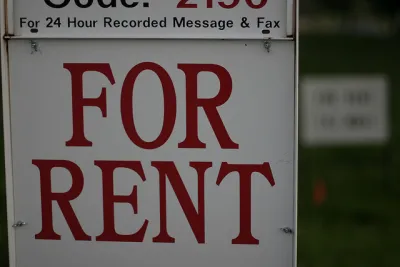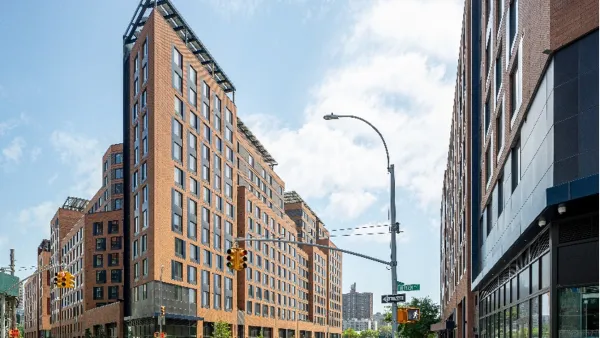With increasing pressure on the nation's supply of affordable housing, low- and middle-income renters are seeing their rents go up while higher-quality apartments drop prices to lure back remote workers.

Over the past year, while residents of high-rent downtowns reconsidered their housing options and high-income renters saw their rents decline, the opposite proved true for low-income renters, reports Catherine Rampell in the Washington Post.
"For well-off tenants, bargains abound. In most major metro areas, rents for high-end residential housing have plummeted, according to data from CoStar, a real-estate analytics company." In Dallas-Fort Worth, high-end apartments saw rents decline by one percent. Chicago saw a drop of 7.6%. Yet average rents on lower-end units ("older or lower-quality structures, with fewer amenities") have increased two percent in DFW and one percent in Chicago in the same time period. In isolated cases, rent went up as much as 40%. Already suffering more from the economic downturn, "low-income households are getting squeezed from both directions — less income and higher prices for what is usually their biggest single monthly expense."
The choice by many higher-income renters who "were already the marginal home buyer" to make the transition to homeownership during the pandemic, according to Jenny Schuetz of the Brookings Institution, has put downward pressure on high-rent apartments, many of which are being vacated by newly untethered remote workers. Combined with a slowdown in construction, this put pressure on landlords to reduce rents to entice new tenants and keep old ones. At the low end of the rental market, however, demand still far outstrips supply. The pandemic-induced "surge in demand for lower-price-point homes ended up bidding those rents higher." Some experts also call the rent increases an "unintended consequence of the federal eviction moratorium imposed last year," which may be incentivizing landlords to make up the lost income with higher rents on the tenants still paying. "Without a greater supply of affordable housing, the two-track pattern is likely to continue," deepening America's economic divide.
FULL STORY: Rents for the rich are plummeting. Rents for the poor are rising. Why?

National Parks Layoffs Will Cause Communities to Lose Billions
Thousands of essential park workers were laid off this week, just before the busy spring break season.

Retro-silient?: America’s First “Eco-burb,” The Woodlands Turns 50
A master-planned community north of Houston offers lessons on green infrastructure and resilient design, but falls short of its founder’s lofty affordability and walkability goals.

Delivering for America Plan Will Downgrade Mail Service in at Least 49.5 Percent of Zip Codes
Republican and Democrat lawmakers criticize the plan for its disproportionate negative impact on rural communities.

Test News Post 1
This is a summary

Test News Headline 46
Test for the image on the front page.

Balancing Bombs and Butterflies: How the National Guard Protects a Rare Species
The National Guard at Fort Indiantown Gap uses GIS technology and land management strategies to balance military training with conservation efforts, ensuring the survival of the rare eastern regal fritillary butterfly.
Urban Design for Planners 1: Software Tools
This six-course series explores essential urban design concepts using open source software and equips planners with the tools they need to participate fully in the urban design process.
Planning for Universal Design
Learn the tools for implementing Universal Design in planning regulations.
EMC Planning Group, Inc.
Planetizen
Planetizen
Mpact (formerly Rail~Volution)
Great Falls Development Authority, Inc.
HUDs Office of Policy Development and Research
NYU Wagner Graduate School of Public Service





























